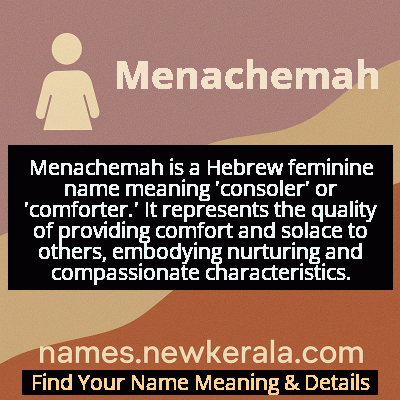Menachemah Name Meaning & Details
Origin, Popularity, Numerology Analysis & Name Meaning of Menachemah
Discover the origin, meaning, and cultural significance of the name MENACHEMAH. Delve into its historical roots and explore the lasting impact it has had on communities and traditions.
Name
Menachemah
Gender
Female
Origin
Hebrew
Lucky Number
8
Meaning of the Name - Menachemah
Menachemah is a Hebrew feminine name meaning 'consoler' or 'comforter.' It represents the quality of providing comfort and solace to others, embodying nurturing and compassionate characteristics.
Menachemah - Complete Numerology Analysis
Your Numerology Number
Based on Pythagorean Numerology System
Ruling Planet
Saturn
Positive Nature
Ambitious, efficient, realistic, and authoritative.
Negative Traits
Materialistic, stressed, confrontational, and can be overly ambitious.
Lucky Colours
Dark blue, black.
Lucky Days
Saturday.
Lucky Stones
Blue sapphire, amethyst.
Harmony Numbers
2, 4, 6.
Best Suited Professions
Business leaders, managers, financial services, law enforcement.
What People Like About You
Leadership, determination, organizational skills.
Famous People Named Menachemah
Menachemah Feinstein
Jewish educator
Pioneered women's Jewish education in Israel and established several educational institutions
Menachemah Levy
Community leader
Founded charitable organizations providing comfort and support to families in crisis
Menachemah Cohen
Author and therapist
Wrote influential books on grief counseling and emotional healing practices
Name Variations & International Equivalents
Click on blue names to explore their detailed meanings. Gray names with will be available soon.
Cultural & Historical Significance
The name connects to several important Jewish concepts, including 'nechama' (comfort) and the traditional mourning practice of 'shiva,' where comforters visit the bereaved. In liturgical context, the Sabbath following Tisha B'Av is called 'Shabbat Nachamu' - the Sabbath of Comfort, based on the prophetic reading from Isaiah that begins 'Comfort, comfort my people.' This establishes comfort as both a human responsibility and a divine promise. The feminine form Menachemah thus represents the living embodiment of this sacred duty, making it a name that carries both personal and collective spiritual significance within Jewish tradition.
Extended Personality Analysis
Individuals named Menachemah are often perceived as naturally empathetic and nurturing, with a strong inclination toward providing comfort and support to others. They tend to be excellent listeners who create safe spaces for people to share their struggles and emotions. Their comforting presence often makes them sought after during difficult times, and they typically possess an intuitive understanding of emotional needs. These individuals usually demonstrate remarkable patience and resilience, able to maintain their compassionate nature even when facing personal challenges. They often excel in caregiving roles, whether professionally or within their personal relationships, and their calming influence can have a profound effect on those around them.
Beyond their comforting nature, those named Menachemah often display strong emotional intelligence and the ability to mediate conflicts with grace and understanding. They tend to be deeply intuitive, able to perceive unspoken emotions and address underlying issues with sensitivity. Their strength lies in their capacity to transform difficult situations into opportunities for growth and healing. While they are naturally giving, they also understand the importance of establishing healthy boundaries to prevent emotional exhaustion. Their combination of compassion and wisdom makes them natural counselors and trusted confidantes, often serving as emotional anchors within their families and communities.
Modern Usage & Popularity
In contemporary times, Menachemah remains a relatively rare but meaningful choice within traditional Jewish communities, particularly among families who value Hebrew names with deep spiritual significance. The name has seen modest usage in Israel and among Orthodox Jewish communities worldwide, often chosen by parents who wish to honor the concept of comfort or who have experienced personal loss and seek to commemorate the idea of consolation. While not appearing on mainstream popularity charts, it maintains a steady presence in religious circles where meaningful Hebrew names are prioritized over trending names. Recent years have seen a slight increase in usage as parents seek unique names with substantial meaning and cultural roots, though it remains far less common than similar-meaning names like Naomi or Rachel.
Symbolic & Spiritual Meanings
Symbolically, Menachemah represents the embodiment of comfort, healing, and emotional restoration. The name carries the metaphorical weight of being a source of solace in times of distress, much like a shelter in a storm or balm for wounded spirits. It symbolizes the human capacity to transform pain into compassion and to serve as a bridge between suffering and hope. In a broader sense, the name represents the feminine aspect of divine comfort and the nurturing principle that sustains communities through difficult times. It serves as a living reminder that comfort is not merely passive consolation but an active force that can mend broken hearts and restore wholeness to individuals and communities alike, embodying the sacred Jewish value of 'gemilut chasadim' - acts of loving kindness.

